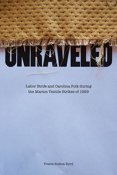Unraveled
Labor, Folk, and Carolina Culture in the Textile Strikes of 1929

It was called “the summer of dynamite.” In 1929, on the eve of the Great Depression, the southern textile belt—from the rayon mills of upper East Tennessee to the bleacheries and weave rooms of the Carolina piedmont—exploded in a full-on civil war marked by political intrigue, kidnapping, attempted and outright murder, rioting, and the threat of armed insurrection against the state. Communists agitated in Gastonia, North Carolina; the American Federation of Labor led organizing efforts in nearby Marion; and the regional elite was forced to choose sides as its forces collided with those of the millworkers and rival unions battling for organizational supremacy.
Drawing on never-before-utilized sources, including minutes of corporate board meetings, union rosters, scrapbooks kept by local residents, courtroom testimony, a wide assortment of news reports, and ballads written by striking workers, Travis Sutton Byrd has woven together a complex and arresting account of the textile strikes that signaled the passage of the great mill-building campaigns of the New South into the modern era. Focusing especially on labor unrest in the town of Marion, while intertwining that story with events elsewhere in the textile belt, Byrd shows in fascinating detail the ways in which the industrial culture of the New South came unraveled during one fateful summer. With fearful memories of turn-of-century Fusion politics—a coalition between the working class and the Republican Party—shaping the response of the region’s Democratic, business-as-usual elite, the outcome was a campaign by the AFL to “Organize the South,” an effort that laid the groundwork for reform under Franklin Roosevelt’s New Deal.
With its novelistic narrative and rich cast of characters—owners and politicians, millhands and reporters, reformers and radicals—Unraveled will seize the attention of anyone interested in the politics of class, culture, and regional transformation.
Travis Sutton Byrd is an independent historian and writer who lives in Asheville, North Carolina. A historical consultant for the International Brotherhood of Electrical Workers, he has lectured on union history in the South at various forums and symposiums. The 1991 recipient of the Thomas Wolfe Prize for Short Fiction, he was also the Madison County, North Carolina, site director for the statewide Support Our Schools program.
